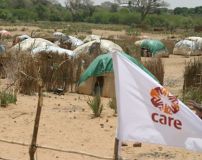Sudan soldier shoots and wounds aid worker
KHARTOUM, Feb 5 (Reuters) – A Sudanese soldier shot an aid worker in the West Kordofan region, underlining the danger facing those trying to help 1.8 million people displaced by conflict in neighbouring Darfur, an aid agency said on Saturday.
 CARE International said in a statement its clearly marked vehicle was fired on without warning on Thursday morning during a visit to a water and sanitation project in West Kordofan, which borders the troubled Darfur area.
CARE International said in a statement its clearly marked vehicle was fired on without warning on Thursday morning during a visit to a water and sanitation project in West Kordofan, which borders the troubled Darfur area.
“The bullet, fired by a Sudanese soldier, struck and wounded a CARE staff member who received medical treatment and is in good condition,” the statement said.
“Sudanese military authorities subsequently apologised to CARE for the incident.”
Darfur rebels who took up arms two years ago have been known to operate in Kordofan and a new rebel movement has claimed attacks in the region since December.
At least 5 aid workers have been killed in Darfur since humanitarian aid began to flow in earnest in April 2004, when a shaky ceasefire was signed between the two main rebel groups and the government.
Tens of thousands have been killed in the fighting, which the United States has called genocide. An independent report commissioned by the United Nations last week stopped short of declaring genocide in the region.
CARE said it was the only agency working in the Kordofan region.
“CARE is currently reviewing the implications of the incident for its staff safety and security in this area, where we have evacuated our staff twice during the past six months due to rebel activity, including a direct attack on a CARE office.”
After years of tribal conflict, two main rebel groups took up arms accusing Khartoum of preferential treatment of Arab tribes in the region.
The international community says Khartoum then armed Arab militias, known as Janjaweed, who carried out a campaign of looting, burning, rape and killing in non-Arab villages.
The government admits arming some militias to fight the rebels but denies any links to the Janjaweed, calling them outlaws.
